Bicycles.
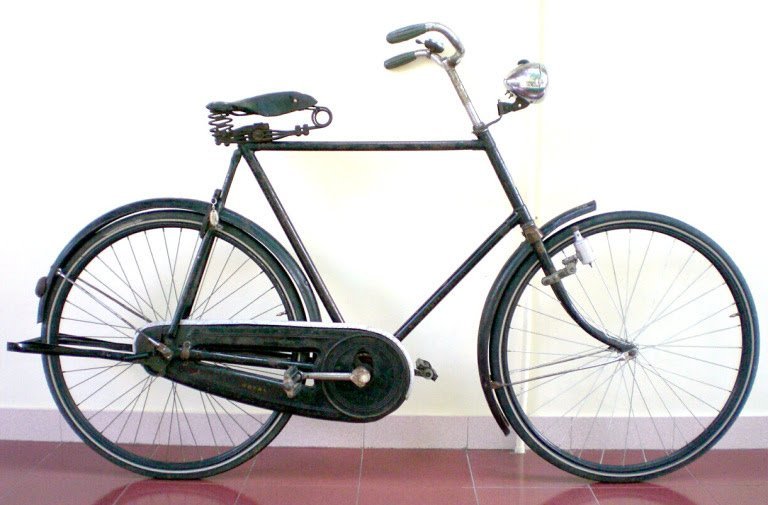
Bicycles are human powered transportation vehicles, which have two wheels. The bike was first introduced in the 18th century in Europe, France to be exact. According to historical news, the country has since the early 18th century to know the two-wheeled transportation equipment called velocipede. For years, velocipede became the only term that refers to the design results of two-wheeled vehicles. Bicycles are the main means of transportation in various regions. In addition to transportation, bicycles have also become a popular form of leisure, and have been adapted for use as children's toys, general fitness, military and police applications, courier services, and cycling.
Pedicabs.
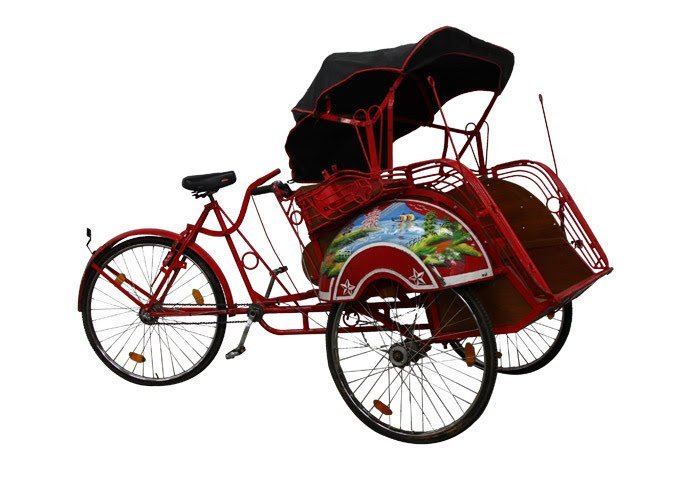
Pedicabs from Hokkien be chia meaning "horse-drawn carriage" are a three-wheeled land transportation that is common in Indonesia and also in parts of Asia. The normal capacity of rickshaws is generally two passengers and a driver. Becak was accidentally discovered, in 1869 a man with an American wife was walking to Japan to enjoy the view of Yokohama city. The man makes a tool that can be used for one passenger whose wife is disabled in order to get around town. The tool is not horse drawn but uses human power. Then the Japanese saw the vehicle and called it jinrikisha.
In the 1800s jinrikisha began to be known Chinese society used as a private vehicle of a noble, they call it rickshaw while the penghelanya called hiki. In 1870 rickshaw was banned from operating. At first in 1941 for the first time in big cities in Indonesia appeared becak. Unlike the jinrikisha and rickshaw that use human power, rickshaws are more modern. Pedicab uses three wheels and driven by two-legged pedaling.
Bajaj.
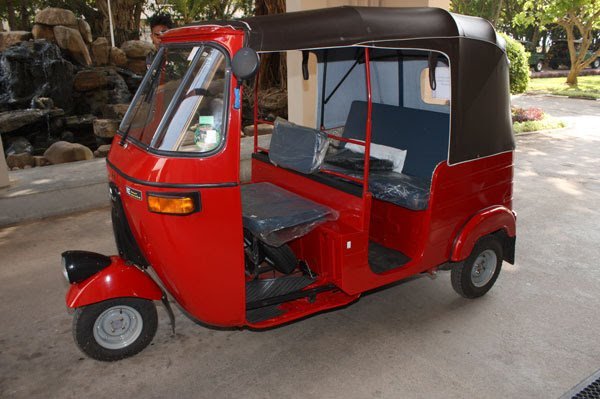
Bajaj is a motor vehicle that has three wheeled wheels and is widely used in Jakarta. In addition to Jakarta, many bajaj are also found in the city of Banjarmasin and Pekanbaru and some district capitals in Indonesia are generally used as a means of public transportation. Bajaj is known to originate from India. Bajaj own name is actually a brand of one of the automotive companies in India, Bajaj Auto. Bajaj passenger capacity is two people, or plus one small child, all of whom will be sitting behind a bajaj driver.
Delman.
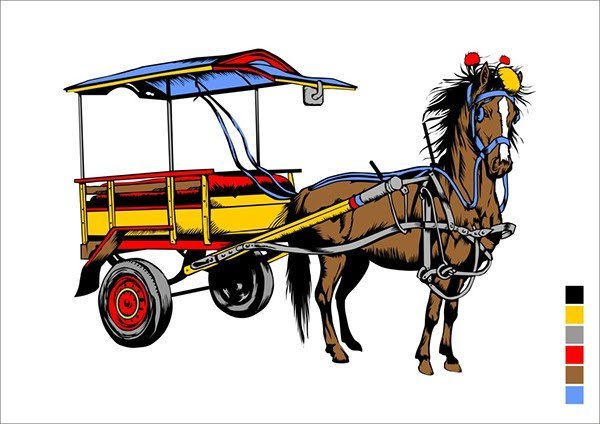
Delman is a traditional, two-wheeled, three-or four-wheeled, horse-style transportation. Variations of transportation using horses include wagons, chariots and horse-drawn carriages. The name of this vehicle comes from the name of the inventor, Charles Theodore Deeleman, a lithographer and engineer during the Dutch East Indies. The Dutch themselves call this vehicle by the name dos-à-dos (back on the back, literally French meaning), which is a kind of carriage whose passenger seat is backsided. The term dos-à-dos was then by the native Batavia abbreviated again to 'sado'.
Naming Delman comes from the inventor of Ir Charles Theodore Deeleman, an engineer, irrigation expert who has an iron workshop on the coast of Batavia (Jakarta now). The same vehicle naming is Sado which comes from the French dos-à-dos which means back to back. Other terms in various regional languages are quite diverse which actually refer to the same thing. Another term known to the public is Dokar. Some believe the name of the documentary comes from English dog car. The existence of dokar as one of the Javanese cultural heritage gives its own characteristic in the tourist spots, such as Parangtritis, Alun-alun Kidul Yogyakarta Indonesia.
Motorcycles.
.jpeg)
Motorcycles are a two-wheeled ground-based transport vehicle. The position of the two wheels in a straight line and at high speed the motorcycle runs stable due to the gyroscopic force. While at low speeds, the stability of a motorcycle depends on the setting of the handlebars by the rider. The first motorcycle was made by German engineer Gottlieb Daimler in 1885 when he installed a machine with perfect combustion on a wooden bike that he designed himself.
Car.
.jpeg)
Cars are ground transportation powered by engine power, four or more wheels (the number is always even), generally using fuel oil (gasoline or diesel) to start the engine. The car stands for automobile derived from the Greek 'autos' (itself) and Latin 'movére' (moving).
Trains.
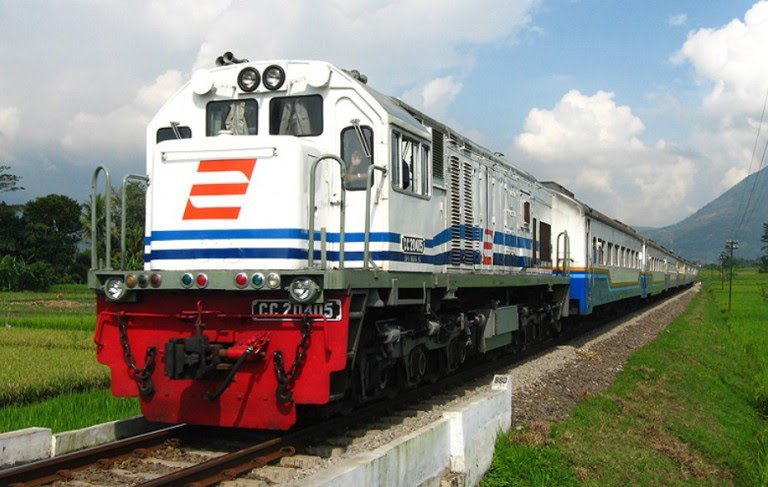
Trains are a form of rail transport consisting of a series of vehicles that are propelled along a railway line to transport cargo or passengers. The motion force is provided by a separate locomotive or individual motor in some units. The train usually consists of two, three or four rails, with a number of monorails and guideways maglev in the mix. The word 'train' comes from the Old French trahiner, from the Latin trahere 'pull, pull'.
After James Watt invented the steam engine, Nicolas Cugnot made a three-wheeled vessel fueled by steam. People call the vehicle an iron horse. Then Richard Trevithick creates a locomotive engine that is coupled with a train and utilizes it on a show in front of the general public. George Stephenson perfected a locomotive that won a locomotive racing race and was used on the Liverpool-Manchester line. At that time the steam locomotives used constructed grasshoppers. Completion for refinement is done to get more effective steam locomotives, enormous power, and able to attract more trains.
The Ship.
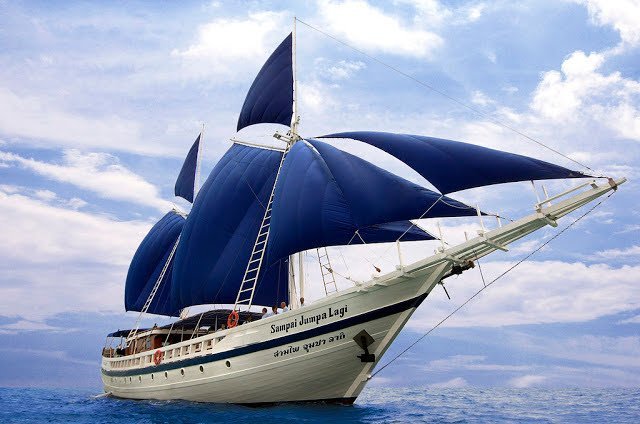
The ship is a means of transportation that serves to transport passengers and goods in the sea or river, as well as a boat or a smaller boat. Ship consists of several types, for example, ferries and submarines. Ships are a means of transportation that moves in the sea. The history of the ship is in line with human adventures. The first known boat was in the Neolithic period, about 10,000 years ago. These early ships have limited functionality: they can move on water, but that's it. Mainly used for hunting and fishing. The oldest canoes found by archaeologists are often made from coniferous tree trunks, using simple stone tools.
To determine the direction, in the past the ship sailed not far from the continent or the mainland. But in accordance with the development of the end of the crew of the ship using the star as a tool of navigation with tools such as compass and astrolabe and maps. Towards the end of the 20th century, navigation is greatly facilitated by GPS, which has great precision with the help of satellites.
Aircraft.

Aircraft is a means of air transportation in the form of aircraft that is heavier than air, winged fixed, and can fly on their own. Generally the term airplane is often also referred to as an aircraft or aircraft or a plane with the same purpose of defining as a vehicle capable of flying in the atmosphere or air. But in the aviation world, the term aircraft is different from an airplane, the term aircraft is much broader because it includes airplanes and helicopters.
The heavier airplane was first flown by the Wright Brothers (Orville Wright and Wilbur Wright) using its own design plane called the Flyer, which was launched in 1903 around the United States. In addition to the Wright brothers, noted some inventors of other aircraft that invented aircraft such as Samuel F Cody who perform the action in the field Farnborough, England in 1910. As for the plane lighter than air had flown long before. The first flight with hot air balloon found by a French citizen named Joseph Montgolfier and Etiene Montgolfier occurred in 1782, then perfected a German named Ferdinand von Zeppelin by modifying a cigar-shaped balloon used to carry passengers and goods in 1900. At the following year the Zeppelin balloon drove air transport to the Zeppelin ship disaster on a trans-Atlantic journey in New Jersey 1936 marking the end of the Zeppelin era despite being still used before World War II. After the Wright era, many aircraft had undergone modifications from both design, form and aircraft engines to meet air transportation needs. The larger commercial carrier was made in 1949 named Bristol Brabazon. Until now the world's largest passenger aircraft was made by airbus industrie from europe with A380 aircraft.